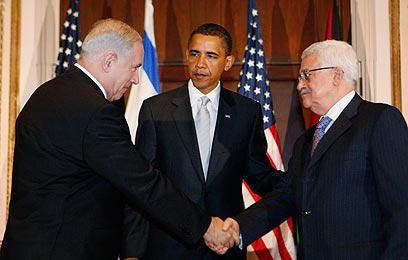
US papers call 3-way summit a failure
Washington Post says American president's meeting with Israeli and Palestinian leaders 'fell well short of the administration's hopes.' NY Times: Obama failed to gain a tangible early goal of his Middle East policy
The Washington Post details the mistakes made by Obama and his team, on his way to losing the trust of the Israeli public and Arab leaders.
"The summit President Obama convened Tuesday… fell well short of the administration's hopes," the Washington Post wrote in its editorial.
"Obama had wanted to announce agreement on the opening of talks on the creation of a Palestinian state, with a deadline of two years. He wanted to outline agreements on how those negotiations would proceed and some of the principles that would underpin them. And he expected to reveal a series of opening confidence-building measures by the two sides, including a freeze on Israeli settlement construction and steps toward normalization by several Arab states.
"What Mr. Obama oversaw, instead, was little more than a photo opportunity with the two leaders – who continue to disagree with each other and with the Obama administration over the terms of the talks."
The Post stressed that the gap between the Obama administration's initial hopes for the UN meeting and what occurred expresses "the miscalculations the president and his team have made."

'A little more than a photo-op' (Photo: AP)
The prestigious newspaper's editorial notes that Obama and his aides assumed that Israelis and Arab governments around the region would welcome an aggressive effort by the new US president to broker an Israeli-Palestinian peace.
"As a practical matter, that hasn't proved true," the editorial claims. "Mr. Netanyahu's right-wing government would prefer to bolster Mr. Abbas' government economically before beginning final peace talks; Mr. Abbas himself has been preoccupied with consolidating his own authority and gaining the upper hand over the rival Hamas movement… Leading Arab states such as Saudi Arabia appear – like Israel – much more concerned with how the Obama administration will handle the threat of Iran."
Unwinnable confrontation with Netanyahu
The Washington Post states that "the administration also concluded, wrongly, that obtaining an unconditional Israeli settlement freeze was an essential first step. In fact settlements are no longer a strategic obstacle to peace; as a practical matter, most of the construction is in areas that will not be part of a Palestinian state."
According to the editorial, "The administration's inflexible stance, unwisely spelled out in public by Secretary of State Hillary Clinton, led to an unwinnable confrontation with Mr. Netanyahu, turned Israeli public opinion against Mr. Obama and prompted Palestinians to harden their own position."
So what should be done? According to the editorial, "Obama must do more to convince average Israelis as well as Arab leaders that his diplomacy is worth investing in."
The Washington Post concludes by saying, "We're told the president reminded Mr. Netanyahu and Mr. Abbas Tuesday of an old diplomatic verity: That the United States cannot want peace more than the parties themselves. That's a reality that this president, like a few before him, will have to live by."
The New York Times criticized Obama as well. The newspaper's political correspondent stated that the American president "has met immovable resistance from Israel over his demand for a full freeze on settlements in the West Bank, is largely setting that issue aside as a first step toward restarting Middle East peace talks… Obama was unable to extract that concession from Israel or other confidence-building moves from Arab states."
She added that Obama was risking "appearing ineffective in having not gained a tangible early goal of his Middle East policy."










